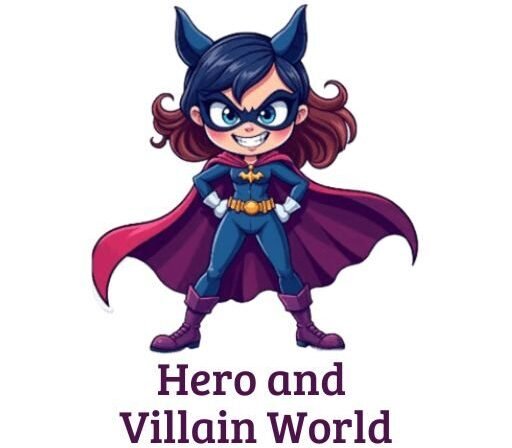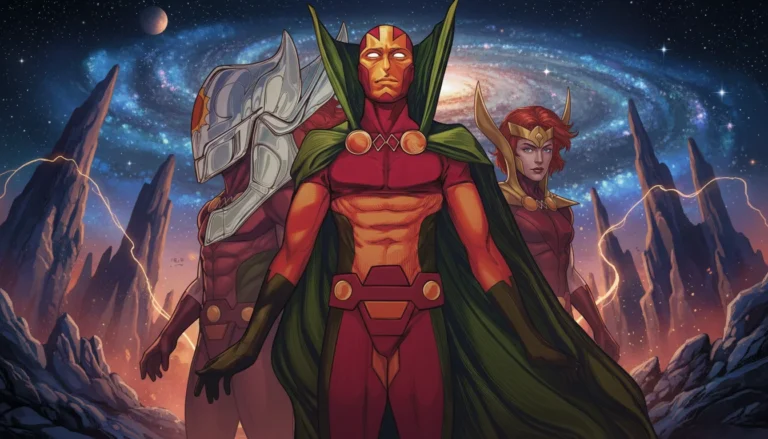Top 5 Reasons Why Spider-Man is Marvel’s Greatest Hero

For many fans, Spider-Man is more than just a superhero; he’s a symbol of hope and resilience. Created in 1962 by Stan Lee and Steve Ditko, this iconic character has revolutionized the genre with his relatable struggles and unique powers.
As noted in an issue of Amazing Spider-Man, he is considered the literal moral fiber of the Marvel Universe, setting the standard for other characters.
What makes Spider-Man stand out among other heroes in the Marvel Universe? His everyday struggles, moral compass, and enduring legacy have cemented his place as a cultural phenomenon, influencing not just comics, but films, TV shows, and global popular culture.
In this article, we’ll explore the top reasons why Spider-Man has earned his title as Marvel’s Greatest Hero.
The Amazing Legacy of Spider-Man
I find that Spider-Man’s enduring popularity stems from his relatable character and the timeless themes associated with him. As a cultural icon, Spider-Man has been a part of our lives for over six decades, captivating audiences with his heroic exploits and personal struggles.
Creation by Stan Lee and Steve Ditko
Spider-Man was created by the legendary duo Stan Lee and Steve Ditko. Their collaboration in the early 1960s brought to life a hero that teenagers could relate to.
Lee wanted a character that embodied the spirit of adolescence, while Ditko designed the iconic costume and visual style that has become synonymous with the character.

First Appearance in Amazing Fantasy #15 (1962)
Spider-Man first appeared in Amazing Fantasy #15 in 1962, a comic book that was initially intended to be the final issue of a failing series.
However, due to Spider-Man’s popularity, it became one of the most valuable comics in history. This debut marked the beginning of a new era in the world of comics.
The Origin of a Legend
The story of Peter Parker, a high school student who gains spider-like abilities after being bitten by a radioactive spider, is a timeless tale that has captivated fans for generations.
The transformation of an ordinary teenager into a superhero, coupled with the tragic death of Uncle Ben, shaped Spider-Man’s heroic journey and continues to inspire new stories.
| Year | Event | Significance |
|---|---|---|
| 1962 | First appearance in Amazing Fantasy #15 | Marked the debut of Spider-Man |
| Early 1960s | Creation by Stan Lee and Steve Ditko | Bringing to life a relatable hero |
| Present day | Continued popularity across generations | Enduring legacy of Spider-Man |
Reason 1: The Ultimate Relatable Superhero
As a character, Spider-Man’s relatability is unmatched, largely due to the everyday struggles of Peter Parker that resonate with readers worldwide. This relatability is a cornerstone of his enduring appeal.
The Everyday Struggles of Peter Parker
Peter Parker’s life as a teenager and later as an adult is marked by financial struggles, relationship issues, and career challenges, making him a relatable character to many.
Unlike other superheroes like Tony Stark or Thor, who are often depicted as being far removed from ordinary human experiences, Peter Parker’s struggles are down-to-earth and familiar to the average person.
For instance, Peter Parker has often struggled to make ends meet, had to deal with personal losses, and faced challenges in his personal and professional life.
These struggles humanize him and make his superhero achievements more accessible and inspiring to the reader.
Balancing Normal Life and Heroism
One of the compelling aspects of Spider-Man’s story is his constant balancing act between his normal life and his responsibilities as a superhero.
This duality creates a rich narrative that reflects real-world challenges people face in their daily lives, making Spider-Man a character that people can empathize with.
The struggle to balance personal life and heroic duties is a recurring theme in Spider-Man comics, making him a relatable superhero who faces challenges that are both extraordinary and mundane.
A Hero for Every Generation
Spider-Man has managed to remain relevant across generations by evolving while maintaining his core relatability. This has made him accessible to readers of all ages and backgrounds.
The character’s ability to adapt to changing times while retaining his fundamental values is a key reason for his enduring popularity.
| Aspect | Description | Impact on Relatability |
|---|---|---|
| Everyday Struggles | Financial, relational, and career challenges | Makes Spider-Man relatable to ordinary people |
| Balancing Life and Heroism | Dual life as Peter Parker and Spider-Man | Reflects real-world challenges, enhancing relatability |
| Timeless Appeal | Evolving with the times while staying true to core values | Maintains relevance across different generations |
By being a character that people can see themselves in, Spider-Man creates a deeper emotional connection with his audience than many other superheroes. This connection is a significant factor in his status as Marvel’s greatest hero.
- DO WHATEVER A SPIDER CAN—Your friendly neighborhood Spider-Man swings into Magic: The Gathering with cards featuring you…
- SWING INTO THE GAME—Magic: The Gathering is a collectible card game that weaves deep strategy, gorgeous art, fantastical…
- SPIDER-MAN CARDS & ACCESSORIES—Travel the Spider-Verse with a box full of packs to open, Land cards to fill out your dec…
Reason 2: “With Great Power Comes Great Responsibility”
One of the key reasons Spider-Man stands out as Marvel’s greatest hero is his adherence to the philosophy “With Great Power Comes Great Responsibility.” This mantra has not only defined his character but has also resonated with audiences worldwide.
The Iconic Catchphrase That Defines a Hero
The phrase “With Great Power Comes Great Responsibility” is easily one of the best catchphrases in comics, and it has a deeper meaning than many other superhero slogans.
Unlike Wolverine’s catchphrase, which focuses on his ability to kill, Spider-Man’s mantra is universally applicable and serves as a moral guide. For instance, a look back at Spider-Man’s greatest battles reveals how this philosophy has shaped his actions and decisions.

Learning Responsibility Through Tragedy
Peter Parker’s failure to stop the burglar who killed Uncle Ben was a defining tragedy that taught him the true meaning of responsibility.
This moment had a profound impact on his character and shaped his story as Spider-Man. The death of Uncle Ben serves as a pivotal moment in the narrative, highlighting the consequences of not using his power responsibly.
How This Philosophy Shapes Spider-Man’s Actions
This philosophy guides Spider-Man’s decision-making even in the most difficult situations. For example, in various comic storylines, Spider-Man faces challenges that test his moral code, forcing him to balance his personal life with his heroic duties.
The way he handles these challenges demonstrates the character’s commitment to responsibility and his role as a hero. The table below summarizes key aspects of Spider-Man’s adherence to this philosophy.
| Aspect | Description | Impact |
|---|---|---|
| Personal Tragedy | Death of Uncle Ben | Taught Peter Parker the importance of responsibility |
| Moral Code | Guiding principle for actions | Shapes decision-making as Spider-Man |
| Heroic Duties | Balancing personal and heroic life | Demonstrates commitment to being a responsible hero |
In conclusion, “With Great Power Comes Great Responsibility” is not just a catchphrase for Spider-Man; it’s a fundamental aspect of his character that resonates with heroes and audiences alike. By embracing this philosophy, Spider-Man sets himself apart as a role model among other heroes.
Reason 3: The Moral Center of the Marvel Universe
Spider-Man’s moral compass is the guiding force behind the Marvel Universe’s heroic endeavors. As Julia Carpenter explains in Amazing Spider-Man #637, Spider-Man is the moral heart of the Marvel Universe, and his example influences other heroes to follow in his footsteps.
Setting the Standard for Other Heroes
Spider-Man’s moral choices have a ripple effect throughout the Marvel Universe. For instance, his refusal to kill his enemies, even in the face of personal tragedy, sets a powerful example for other heroes.
This commitment to doing what’s right, even at great personal cost, is a hallmark of Spider-Man’s character and inspires others to adhere to a similar moral code.
Spider-Man’s Unwavering Moral Compass
Peter Parker‘s unwavering commitment to his moral principles is a defining characteristic. Despite facing numerous challenges and adversaries, Spider-Man consistently chooses the harder right over the easier wrong.
This moral steadfastness is a beacon of hope in the Marvel Universe, encouraging other heroes to stand by their own moral convictions.

The Web of Morality That Binds Marvel Heroes
The influence of Spider-Man’s morality can be seen in various heroes across the Marvel Universe. In alternate universe stories where Spider-Man abandons his moral code, the world becomes a darker place, highlighting the importance of his moral example.
The table below summarizes the impact of Spider-Man’s morality on the Marvel Universe.
| Aspect | With Spider-Man’s Morality | Without Spider-Man’s Morality |
|---|---|---|
| Heroic Behavior | Heroes follow Spider-Man’s example, adhering to a strong moral code. | Heroes become more morally ambiguous, leading to a darker universe. |
| Personal Cost | Spider-Man faces personal costs for his moral choices, such as the death of loved ones. | The absence of moral restraint leads to a world with more severe consequences. |
| Influence on Others | Other heroes are inspired by Spider-Man’s moral leadership, creating a positive example to share. | The lack of Spider-Man’s moral influence leads to a less heroic and more divided universe. |
In conclusion, Spider-Man’s role as the moral center of the Marvel Universe is pivotal, influencing the actions and decisions of other heroes and shaping the fabric of the universe itself.
Reason 4: An Unmatched Rogues Gallery
One of the most compelling aspects of Spider-Man’s story is his extensive rogues gallery. Spider-Man has some of the greatest villains of any comic character, offering a diverse range of motivations and personality types that present the Wall-Crawler with intriguing foils.
Iconic Villains That Test Spider-Man’s Limits
Spider-Man’s villains are not just random threats; many have direct connections to Peter Parker‘s life, making their conflicts deeply personal. This personal aspect is a hallmark of Spider-Man’s rogues gallery, setting it apart from other superheroes.
The Green Goblin and Personal Vendettas
The complex relationship between Spider-Man and the Green Goblin/Norman Osborn is particularly noteworthy.
This nemesis has caused some of the most devastating losses in Peter Parker‘s life, including the tragic death of Gwen Stacy, a loss that still resonates deeply within the story of Spider-Man.
How Spider-Man’s Villains Reflect His Character
Many of Spider-Man’s villains mirror aspects of his own character, from Doctor Octopus’s scientific brilliance to Venom’s corrupted version of his powers.
This mirroring not only tests Spider-Man’s abilities but also his moral code, making his battles both physically and emotionally challenging.
The diversity of his rogues gallery allows for a wide range of storytelling possibilities, from lighthearted adventures to deeply personal tragedies, contributing to the character’s longevity in comics.
Reason 5: Cultural Impact and Adaptability
Spider-Man’s influence on modern pop culture is a testament to the character’s timeless appeal. Over time, Spider-Man has become a household name around the world, symbolizing heroism and relatability.
Spider-Man Across Comics, Films, and TV
Spider-Man’s presence across various media platforms has been a key factor in his enduring popularity.
From his original comic books to blockbuster films and TV shows, Spider-Man has captivated people of all ages. The character’s unique powers and superpowers have been reimagined in numerous ways, keeping the character fresh and exciting.
Diversity in the Spider-Verse
The introduction of diverse characters like Miles Morales, an African-American/Latino teenager, and Spider-Gwen has expanded the Spider-Verse, making the character more inclusive.
This version of Spider-Man has resonated with new audiences, ensuring the character remains relevant.
Enduring Popularity Across Generations
Spider-Man’s ability to adapt to changing time while maintaining his core values has allowed him to remain a beloved character across generations.
As I explore in an article on The Ringer, Spider-Man’s relatability and heroism continue to inspire people around the world in a unique way, making him a true cultural icon.
Conclusion: Why Spider-Man Will Always Be Marvel’s Greatest Hero
The reasons why Spider-Man stands out as Marvel’s greatest hero are multifaceted and deeply rooted in his character and stories.
Throughout this article, we’ve explored five key reasons that solidify his position: his relatability to everyday people, his moral philosophy embodied in the phrase “with great power comes great responsibility,” his role as the moral center of the Marvel Universe, his iconic rogues gallery, and his significant cultural impact.
Spider-Man’s enduring popularity across generations speaks to the universal appeal of his character. From his origin story as a teenager to his current status as a seasoned hero, Spider-Man’s journey resonates with fans of all ages.
His struggles, both as a hero and in his personal life, particularly his relationship with Aunt May, add depth to his character, making him a beloved figure in the world of superheroes.
As we look to the future, Spider-Man’s legacy continues to grow with new comics, films, and other media. His character remains a vital part of the Marvel Universe, inspiring new stories and adaptations.
For fans looking to dive deeper into Spider-Man’s world, here are some frequently asked questions:
- What are Spider-Man’s powers? Spider-Man has superhuman strength, agility, and the ability to cling to walls.
- Who is Spider-Man’s most iconic villain? The Green Goblin is often cited as one of Spider-Man’s most iconic foes.
- How has Spider-Man been adapted into other media? Spider-Man has been featured in numerous films, TV shows, and video games.
- What is the significance of “Aunt May” in Spider-Man’s life? Aunt May is a central figure in Peter Parker’s life, providing emotional depth to his story.
- How does Spider-Man’s moral philosophy impact the Marvel Universe? His philosophy sets a standard for other heroes, influencing the moral fabric of the universe.
- What makes Spider-Man relatable to audiences? His everyday struggles and personal losses make him a relatable character.
- Can you name other versions of Spider-Man? Yes, there are several, including Miles Morales and Spider-Gwen.
- Why is Spider-Man considered Marvel’s greatest hero? For the reasons outlined in this article, including his relatability, moral philosophy, and cultural impact.
For more insights into the world of superheroes and to explore other fascinating characters, visit the Hero and Villain World blog. Discover more about your favorite heroes and stay updated on the latest in the world of comics and beyond.
FAQ
Q: What makes Spider-Man a relatable character?
A: I believe it’s because he’s a teenager turned superhero, just like many of us, he faces everyday struggles, and his personal life is often intertwined with his heroic endeavors, making him a character that people can easily identify with.
Q: How does Spider-Man’s origin story impact his actions as a hero?
A: The death of his Aunt May and the lessons he learned from his Uncle Ben significantly shape his philosophy, “With great power comes great responsibility,” which guides his decisions and actions as a hero.
Q: What is the significance of Spider-Man’s rogues gallery?
A: I think it’s because his villains, such as the Green Goblin, are often a reflection of his own character and the challenges he faces, making their conflicts more personal and engaging.
Q: How has Spider-Man’s character evolved over time?
A: Over the years, Spider-Man has undergone various interpretations, including different versions like Miles Morales and Spider-Gwen, which has helped keep the character fresh and relevant to new generations of fans.
Q: What is the impact of Spider-Man on the Marvel Universe?
A: As a hero, Spider-Man sets a high standard for others, and his unwavering moral compass has a positive influence on the Marvel Universe, making him a beloved character among fans.
Q: Why is Spider-Man’s story still widely popular today?
A: I believe it’s because his story is a timeless tale of heroism, responsibility, and the human condition, which continues to resonate with audiences across different cultures and age groups.







